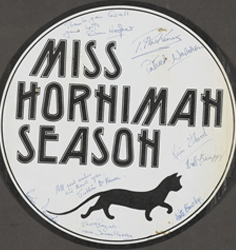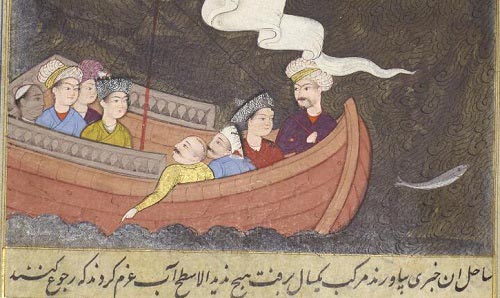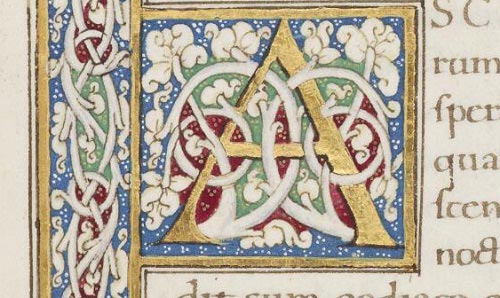
Performing Arts Collections
The Library’s performing arts collections contain a wealth of printed and archival material for the study of drama and theatre history from the 17th century to the present day.

Our collections cover areas as diverse as plays and playwrights, theatre history and performance, and the history of film and cinema. In addition to play texts, playbills and programmes, our printed material includes memoirs and biographies of actors and playwrights, plus works on dramatic criticism, theatrical history and stagecraft.
The Library houses the papers of several 19th- and 20th- century theatre companies, playwrights, theatrical directors and designers, composers, impresarios and critics. It illustrates the work of radical and regional theatre, and early work by film actors and directors.
Plays and playwrights
Our extensive holdings of published play texts date from the 17th century onwards. All four folios of the plays of William Shakespeare, published in 1623, 1632, 1664 and 1685, are present. 19th- and 20th-century facsimiles of the First Folio include the first type facsimile and the first photo-lithographic facsimile. A grangerized copy of Shakespeare’s plays (1793), formerly belonging to the Shakespearean editor and commentator George Steevens, has been enriched by the addition of several thousand rare engravings. Illustrated and fine print editions of Shakespeare’s works are complemented by modern texts and critical studies.
Facsimiles of early play texts include the Malone Society Reprints and the Tudor Facsimile Texts. Works by dramatists of the Jacobean and Caroline eras are well represented but tend to be held in later editions. Our holdings of Restoration drama include both 17th-century publications and early 18th-century illustrated editions. Prominent playwrights include: William Congreve, George Farquhar, Sir George Etherege, William Wycherley, Thomas D’Urfey, Thomas Otway, Nathaniel Lee and Thomas Shadwell. Our collections also include plays by 18th-century female writers, such as Aphra Behn, Susanna Centlivre and Hannah Cowley.
The George L. Brook Drama Collection contains 19th- and 20th-century plays, many of which are rare. The majority are printed in English, but most European languages are represented.
Our holdings include the papers of the popular Victorian dramatist Henry Pettitt and the Victorian playwright George Sims, both of whom specialised in melodrama, reflecting contemporary social concerns. These collections sit alongside the papers of their contemporary Francis Neilson, writer, playwright, social reformer and Member of Parliament.
From the 19th and early 20th century, our collections consist of the papers of Francis Sladen-Smith, a Manchester based playwright and founder/director of The Unnamed Society, an amateur theatre company (so called because the founders were unable to think of a suitable name). Also included are the papers of Allan Noble Monkhouse, and Charles Edward Montague, both playwrights, novelists and journalists.
Theatre history and performance
The J. R. Allardyce Nicoll Drama Collection and the William Holloway Travelling Theatre Printed Collection (not yet catalogued) contain a substantial number of acting editions of 19th-century plays, from publishers such as Samuel French, Thomas Hailes Lacy and John Dicks. Aimed at performers and others involved in the staging of plays, these editions include stage directions, set descriptions, notes on costumes and instructions to actors.
Other series represented include Oxberry’s 'New English Drama', Mrs Inchbald’s ‘The British Theatre’, Cumberland’s ‘British Theatre’ and ‘Minor Theatre’, and Bell’s ‘British Theatre’. The Basil Dean Book Collection includes a number of plays marked up as ‘producer’s cop[ies]’, some from the Liverpool Repertory Theatre, where Dean worked as Controller from 1911 to 1913.
Our collection of more than 900 bills for plays and other entertainments from our Streel Literature Collection, dating mainly from the first half of the 19th century, provide an insight into the repertoire of theatres in London and beyond. Provincial venues include Manchester and Liverpool. Portable and travelling theatres, mainly in Lincolnshire, Hertfordshire and Cambridgeshire, are also represented. Our printed collections include more than 650 theatre programmes. These date mainly from the early 20th century and include performances in London, Manchester and Stratford-upon-Avon.
The archive collections relating to theatre history and performance are particularly varied, including the papers of Annie Horniman, pioneer of the modern repertory theatre movement. Theatre and education is represented by the collections of Professor Hugh S. Hunt, Professor of Drama at the University of Manchester, and Peter Slade, lifelong campaigner for the importance of drama education, drama therapy and children’s theatre.
Theatre buildings and set design can be found in the papers of Stephen Joseph, theatre director, producer and designer, best remembered as one of the champions of new theatre forms, especially theatre-in-the-round. Also included are the papers of Manchester architect Alfred Darbyshire who had a lifelong personal and professional interest in drama and the theatre, and as an architect specialized in theatres.
The archives of 20th-century theatre companies and organisations are represented in the Pit Prop Theatre Company, a radical company founded in 1979, which set out to challenge many of the assumptions and attitudes prevalent in society, and the North West Playwrights, an independent organisation founded to develop and promote new writing for the theatre in the north west of England.
History of film and cinema
Our holdings relating to film and cinema are not numerous, consisting of the papers of Basil Dean, actor, dramatist and theatrical impresario, and Robert Donat, actor and film star.
In 1907 Dean joined Annie Horniman’s Gaiety Theatre in Manchester, leaving in 1911 to become the first Controller of the Liverpool Repertory Theatre, later to be called the Liverpool Playhouse. In 1919, with Alec Rea, he formed the ReandeaN Company and this partnership made an outstanding contribution to the British theatre in the 1920s. Basil Dean was among the first to make British talking pictures. In 1929, with Reginald Baker, he founded Associated Talking Pictures Ltd, which later became the Ealing Studios, and in the 1930s his career combined both stage and films.
Robert Donat’s success in provincial theatre, and later in the West End, brought him important film work, especially with Sir Alexander Korda. His best-known film role was as the eponymous schoolmaster in ‘Goodbye, Mr Chips’, for which he was awarded an Oscar for best actor in 1940. During the 1930s and ’40s, Donat continued to combine film and theatre work, but ill-health curtailed his career and brought his premature death in 1958.
Born in Manchester, Caroline Alice Lejeune (1897-1973) was one of the most prominent film critics of her generation, and probably the earliest professional female critic in Britain. She wrote mainly for the Manchester Guardian and the Observer. She was a pioneer in her field, one of the first to treat cinema as an art-form worthy of criticism in the same way as art or music, and to recognise that its audience was not just middle-class white men. The files contain film adverts, film summaries, some handwritten notes and annotations, publicity bulletins, cast lists, photographs, publicity booklets, and newspaper cuttings. They are an invaluable resource for the study of film and film critique.
Music and music criticism
Our archival holdings relating to music and music criticism include the papers of Delia Derbyshire, composer and pioneer of British electronic music; Ernest Wilson, musician and composer, and Michael Kennedy, Manchester-born music critic and author.
Delia Derbyshire spent over a decade at the BBC’s radiophonic workshop, which provided theme and incidental music and sound for BBC radio and television programmes. Here she produced her electronic realisation of Ron Grainer’s theme tune for the hugely popular series Doctor Who.
Ernest Wilson is best-known for his period performing with and co-writing for the Victor Silvester Orchestra during a time when dance halls were one of the predominant forms of entertainment.
Michael Kennedy was one of the leading music critics of the 20th century. He was appointed Staff Music Critic of the Telegraph in 1950 and for over sixty years he wrote many hundreds of reviews for the Daily Telegraph and Sunday Telegraph. He wrote books on Richard Strauss, Gustav Mahler and Edward Elgar, and histories of the Hallé Orchestra‚ and the Royal Manchester (later Northern) College of Music.
Our Methodist Archives house the papers of three musicians in the Wesley family. Music and education is represented in the papers of Humphrey Procter-Gregg, head of the Music Department at the University of Manchester for over thirty years, and the first Professor of Music, from 1954 to 1962. In our printed collections, in addition to medieval musical manuscripts, there are several scores of 18th- and 19th-century British music.
List of collections
Physical collections
- J. R. Allardyce Nicoll Drama Collection
- George L. Brook Drama Collection
- Basil Dean Archive
- Basil Dean Book Collection
- Alfred Darbyshire Collection
- Delia Derbyshire Papers
- Robert Donat Archive
- Annie Horniman Papers
- Hugh Hunt Papers
- Stephen Joseph Papers
- Michael Kennedy Papers
- Allan Monkhouse Papers
- C. E. Montague Papers
- Francis Neilson Papers
- North West Playwrights Archive
- Henry Pettitt
- Pit Prop Theatre Company Archive
- William Shakespeare Printed Works
- George R. Sims Collection
- Peter Slade Collection
- Street Literature Collection
- Ernest Wilson Papers
Digital collections
- Broadside Ballads in Manchester Digital Collections
Further information
Related subject pages
Rylands blog posts
- Julie Ramwell, Charles Calvert and the Prince’s Theatre: 1864–75
- Julie Ramwell, The Rise and Fall of Manchester’s Theatre Royal: 1775–1921
- Jessica Smith, Annie Horniman (1860–1937: theatre patron and manager)
- Jessica Smith, Robert Donat (1905–1958), actor

Exploring subject areas
An overview of our Special Collections, including information about the background and history of our holdings.

Special Collections A-Z
Explore the Special Collections through the collection names and descriptions using our searchable A-Z tool.
